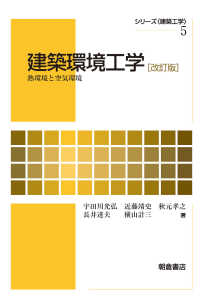- ホーム
- > 洋書
- > 英文書
- > History / World
Full Description
Since the end of the nineteenth century, traditional historiography has emphasized the similarities between Italy and Germany as "late nations", including the parallel roles of "great men" such as Bismarck and Cavour. Rethinking the Age of Emancipation aims at a critical reassessment of the development of these two "late" nations from a new and transnational perspective. Essays by an international and interdisciplinary group of scholars examine the discursive relationships among nationalism, war, and emancipation as well as the ambiguous roles of historical protagonists with competing national, political, and religious loyalties.
Contents
List of Illustrations
Acknowledgments
Introduction
Martin Baumeister, Philipp Lenhard, Ruth Nattermann
Section 1: Concepts and Perspectives
Chapter 1. Nineteenth-Century Italy and Germany beyond National History
Amerigo Caruso
Chapter 2. Rethinking Nation and Family
Ilaria Porciani
Section 2: Family and Nation
Chapter 3. The Morenos between Family and Nation: Notes on the History of a Bourgeois Mediterranean Jewish family (1850-1912)
Marcella Simoni
Chapter 4. Portrait of a "Political Lady": Family Ties and National Activism around 1848 in the Italian and German States
Giulia Frontoni
Chapter 5. Emancipation, Religious Affiliation, and Family Status around 1900
Angelika Schaser
Section 3: Religion and Education
Chapter 6. The Legacy of Adam and Eve: Morality and Gender in Jewish "Catechisms" in Nineteenth-Century Germany
Philipp Lenhard
Chapter 7. The Transformation of Jewish Education in Nineteenth-Century Italy: The Meaning of "Catechisms"
Silvia Guetta
Chapter 8. Religion and Nation: Catholic and Protestant Female Education and Cultural Models in Germany (1871-1914)
Sylvia Schraut
Chapter 9. Women for the Homeland: Comparing Catholic and Protestant Female Education in Italy (1848-1908)
Liviana Gazzetta
Section 4: Politics of Women's Emancipation
Chapter 10. Denomination Matters: Strategies of Self-Designation of the German Women's Movement
Anne-Laure Briatte
Chapter 11. German and Italian Advocates for Women's Emancipation at the International Congress for Women's Achievements and Women's Endeavors in Berlin (1896)
Magdalena Gehring
Section 5: Patriotism and Gender
Chapter 12. Historian Between Two Fatherlands: Robert Davidsohn and World War I
Martin Baumeister
Chapter 13. Between Motherhood and Patriotic Duty: Marital Correspondence as a Key Source for the Understanding of French-Jewish Women's Perspectives on World War I
Marie-Christin Lux
Section 6: War and Violence
Chapter 14. "An Expression of Horror and Sadness"? (Non)Communication of War Violence Against Civilians in Ego Documents (Austria-Hungary)
Christa Hämmerle
Chapter 15. Hunger, Rape, Escape: The Many Aspects of Violence against Women and Children in the Territories of the Italian Front
Nadia Maria Filippini
Section 7: War Experience and Memory
Chapter 16. The Construction of the Enemy in Two Jewish Writers: Carolina Coen Luzzatto and Enrica Barzilai Gentilli
Tullia Catalan
Chapter 17. Heroic Fathers, Patriotic Mothers, Fallen Sons: National Belonging and Political Positioning in Italian-Jewish Families' Versions of World War I
Ruth Nattermann
Chapter 18. The Commemoration of Jewish Soldiers in Austria
Gerald Lamprecht
Index








